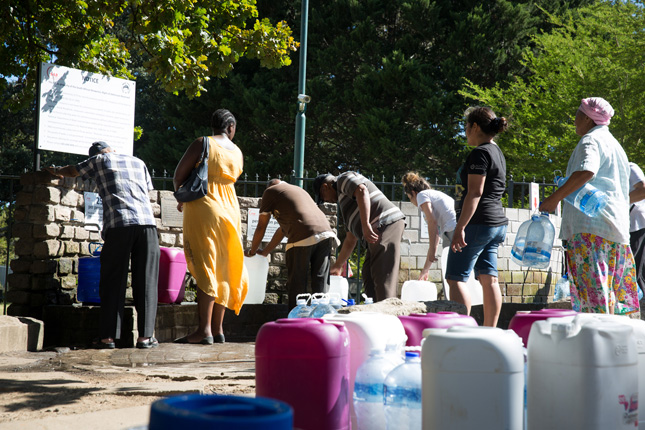-
Avoiding a Water Crisis: What’s Next for Cape Town — and Beyond?
April 20, 2018 By Wilson Center Staff
Intense drought in South Africa’s Western Cape Province has led the world-renowned city of Cape Town to the brink of “Day Zero”—the date at which residents would be forced to collect strictly rationed water supplies from shared distribution taps. Water conservation efforts have so far prevented a massive water shutdown, but the city’s rapid population growth and reliance on surface water dams makes it particularly vulnerable to lower precipitation levels.
As the first major industrialized city to face such water shortages, Cape Town serves as a harbinger of the increasingly complex challenges that are likely to arise in other fast-growing cities as climate change intensifies.
In a recent Ground Truth Briefing, experts and reporters in Cape Town and beyond discussed the critical issues surrounding the city’s looming water crisis and lessons learned for other urban areas facing water shortages.
“From first glance, you wouldn’t really know that there’s an emergency. Parks are green, street life goes on as it usually would. There are signs and posters around the city that make it very clear to save water,” said Brett Walton, a reporter for Circle of Blue who is currently in Cape Town to cover the crisis. But “look a little deeper [and] it’s very clear that people are reacting and have changed,” he said.
“You have some wealthy residents that are drilling their own personal wells so that they can get off the grid, so to speak,” said Walton. “Citywide, the main strategy has been ‘use less.’ The city found out early on that increasing supply during this drought wasn’t going to happen.”
In 12 years, demand will outstrip supply in South Africa by 17 percent, said Mary Galvin, Associate Professor at the University of Johannesburg. “This has been a wake-up call in South Africa about what’s needed—not just in Cape Town, but in other provinces that are facing the same or even more extreme challenges,” she said.
“It’s not just a technical issue,” said Galvin, citing the existing inequality and poor governance in Cape Town. “This emphasis on availability and scarcity sort of puts us away from broader access questions, which is also key to water security,” she said.
“It’s high time to look at demand management. It’s high time to look at how are people using water, how are people wasting water,” said Eric Viala, the Director and Chief of Party of the Sustainable Water Partnership. “At the end of the day, we should look at changing practices and behavior.”
“We will have more and more events like what happened in Cape Town as populations grow and water demand grows,” said Viala. “We don’t know when those droughts will happen [and] we are not even able to predict what will be the probability of those events happening… There is not enough data.”
“We always say, you can’t manage what you don’t measure, so I think it’s important to emphasize the critical initial task of monitoring water—where it is, quantity and quality—and then, informing the public,” said Viala.
Photo Source: Shutterstock, not for reuse.
 A Publication of the Stimson Center.
A Publication of the Stimson Center.



